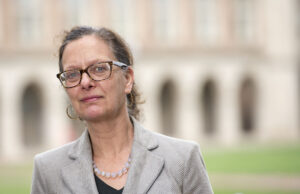Margaret Garb, professor of history in Arts & Sciences and co-director of the Washington University Prison Education Project (PEP), died Saturday, Dec. 15, 2018, after a long battle with cancer. She was 56.

An internationally recognized scholar of race and urban history, Garb was born in Trenton, N.J., and raised in an 18th-century farmhouse in Buckingham Township, Pa. Her father, who served as Bucks County president judge, was passionate about prison reform, especially for young offenders; her mother was a reproductive rights activist.
Garb studied at the Cordon Bleu in Paris before earning her bachelor’s degree in comparative religion from the University of Vermont. She then covered the police beat as a reporter in Chicago and later wrote for The New York Times and In These Times, among others.
Garb earned her master’s degree in history from the University of California, San Diego, and her doctorate from Columbia University in New York, where she studied with Eric Foner.
She joined the Washington University faculty in 2001, teaching courses on the American city and the history of poverty and social reform. Her numerous publications include the books “City of American Dreams: A History of Home Ownership and Housing Reform, Chicago 1871-1919” (2005) and “Freedom’s Ballot: African-American Political Struggles in Chicago from Abolition to the Great Migration” (2014).
Garb established PEP with Robert Henke, professor of drama, in 2014, thanks to a three-year grant from the Bard Prison Initiative. “As a teacher, I’ve spent years training and gaining certain kinds of skills,” she observed at the time. “It seemed worthwhile to think about how to use those skills most effectively to improve the society we live in.”
Today, PEP receives ongoing support from the Office of the Provost and is the only program of its kind nationally to be fully funded by its university. Courses have grown from two per semester to 17 during the 2018-19 academic year. The first PEP graduation ceremony will take place in May.
“Maggie was one of the most inspiring people I have ever met,” Henke said. “She was — and really still is — the heart and soul of the project. Our program will always be identified with her and her spirit.”
Garb recently held fellowships at the Gilder Lehrman Institute of American History and the Collegium de Lyon in France. She also won a Fulbright Fellowship to study in the Philippines, though her illness prevented her from going. Last spring, she was featured on C-SPAN’s “Lectures in History” program, discussing the birth of the skyscraper.
Garb is survived by her husband, Mark Pegg, also a professor of history; a daughter, Eva Garb; and siblings, Emily and Charles Garb.
Memorial contributions may be made in Garb’s name to the Department of History. To do so, visit gifts.wustl.edu and enter “In memory of Margaret Garb” in the “Special instructions” field.